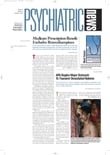The second-generation antipsychotic medications clozapine (Clozaril) and olanzapine (Zyprexa) are associated with significantly increased insulin resistance, as well as impaired glucose effectiveness, than is risperidone (Risperdal), even in patients with normal body-mass indexes.
That's the major finding in a study by David Henderson, M.D., an assistant professor of psychiatry at Harvard Medical School and Massachusetts General Hospital, and colleagues and reported in the January Archives of General Psychiatry.
The association demonstrates what researchers believe could represent“ a one-two punch,” causing abnormalities in two different metabolic pathways that regulate the body's utilization of glucose. The finding may help explain why around 25 percent of adverse-event reports tying the two “atypical” antipsychotics to treatment-emergent dysfunction in glucose metabolism seem to occur in patients relatively soon after initiating medication therapy and prior to any significant weight gain.
“In our study comparing the three medications in nonobese patients, we found significant differences between the three drugs on a sensitive measure called the insulin sensitivity index [SI],” said Henderson.“ Both clozapine and olanzapine were associated with significantly reduced insulin sensitivity compared to risperidone.”
The research was funded by grants from the National Institutes of Health General Clinical Research Center and the National Alliance for Research on Schizophrenia and Depression. In addition, Henderson received an investigator-initiated independent research grant from Janssen Pharmaceutica, the maker of the Risperdal brand of risperidone used in the study.
Henderson and his colleagues used the frequently sampled intravenous glucose tolerance test (FSIVGTT) to determine multiple parameters involved in glucose metabolism in 41 nonobese adults with schizophrenia or schizoaffective disorder who were matched for body-mass index, sex, and race. The FSIVGTT is a complex and demanding protocol involving collection of 38 different samples of blood from a patient spanning a period of more than three hours. Blood is first taken 10 minutes and five minutes before administering an IV dose of glucose and then at set intervals over 180 minutes following the glucose challenge dose. Henderson's team then used the MINMOD computer software program, developed by Richard Bergman, Ph.D., at the University of California at San Diego, to analyze the numerous blood samples for multiple measures of glucose metabolism.
“MINMOD allows us to assess not only how the body is responding to that glucose challenge through the secretion of insulin by beta-cells in the pancreas,” Henderson explained, “but also to look at what is actually happening to the glucose—how the body is utilizing that glucose.”
In most of the measures of glucose metabolism they looked at, Henderson said, patients taking clozapine appeared to have the most significant changes in glucose metabolism, followed by those taking olanzapine. The two groups, however, were not statistically significantly different on any of the measures. Patients taking risperidone showed glucose metabolism that was not significantly different from that reported for normal, healthy adults.
“Now I think for me,” Henderson continued, “the more interesting finding is that there is another parameter that the MINMOD allows you to look at called SG [glucose effectiveness], which is a measure of the uptake and utilization of glucose that is unrelated to insulin action. SG is closely dependent upon the cellular glucose transport system. Surprisingly, we found that there were [statistically significant] reductions in SG in patients taking both clozapine and olanzapine, relative to those on risperidone.”
Henderson noted that normally in patients with a reduced sensitivity to insulin—more commonly referred to as insulin resistance—the body compensates by increasing glucose transport.
“Normally, if SI goes down, the system compensates by increasing SG,” he said, the opposite of what he and his team observed.
“This could represent a blocking of glucose transport by the two drugs,” Henderson hypothesized, which, he added, has been shown in vitro with some of the second-generation antipsychotics.
“At any rate, it appears to represent a second hit. These two drugs appear to be causing insulin resistance, even in nonobese patients, and then there is some sort of impairment in utilization of glucose.”
“This is perhaps the best cross-sectional study in the literature concerning this issue,” noted Murali Doraiswamy, M.D., an associate professor of psychiatry and head of the Division of Biological Psychiatry at Duke University. “This study shows that even in nonobese subjects, there are demonstrable effects of some antipsychotics on metabolic parameters and supports our original finding that many cases of diabetes occur in people [taking antipsychotics] without weight gain.”
John Newcomer, M.D., an associate professor of psychiatry at Washington University in St. Louis, added, “This replicates and extends our previous study, using a similar but more rigorous and sensitive approach.” Newcomer said the findings “could serve as a possible explanation for those case reports where people seem to develop some hyperglycemia or diabetes very early in treatment and without any substantial gain in adiposity. Perhaps this represents some evidence for direct drug effect on glucose metabolism.”
Henderson, Doraiswamy, and Newcomer cautioned that the results of the study must be taken in context, noting that the study was cross-sectional in design and followed a small number of patients. In addition, many factors could confound the results, such as patients' exposure to other antipsychotic medications prior to the study, or the use of antidepressants or the mood stabilizers lithium or valproate.
“Overall,” concluded Newcomer, “it's a very nice study, and I think, most importantly, it represents another step in raising the level of the debate on this topic above case reports or large, retrospective database analyses. While there is obvious value in prospective, randomized, clinical trials, this study is an elegant demonstration of how, sometimes, there are experimental questions that cannot be answered by randomization and must be controlled for in some other experimental way.”
Henderson said his take-home message is that “the effects of these drugs—at least these two—are concerning, and what this really shows us is that we need to be concerned about glucose metabolism [in patients taking antipsychotic medications] regardless of what the patient looks like—whether they gain a lot of weight or not.”
Arch Gen Psychiatry 2005 62 19
